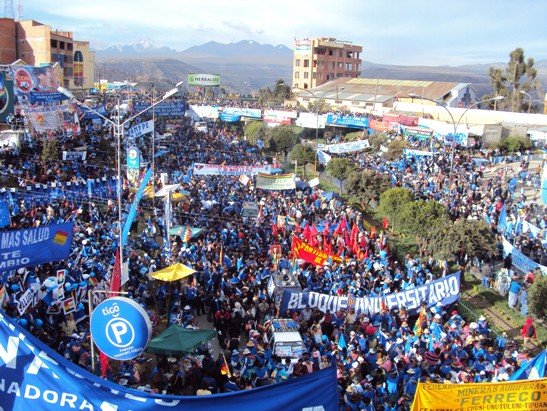 BOLIVIA, 6 DECEMBER 2009. Evo Morales, incumbent presidential candidate for Movimiento al Socialismo (Movement towards Socialism, MAS), has been returned as President of Bolivia with a landslide 62% of the vote. MAS also won 25 out of 36 seats in the Bolivian Senate, gaining the two-thirds majority necessary for approving constitutional changes, key legislation, and judicial appointments.
BOLIVIA, 6 DECEMBER 2009. Evo Morales, incumbent presidential candidate for Movimiento al Socialismo (Movement towards Socialism, MAS), has been returned as President of Bolivia with a landslide 62% of the vote. MAS also won 25 out of 36 seats in the Bolivian Senate, gaining the two-thirds majority necessary for approving constitutional changes, key legislation, and judicial appointments.
This victory will enable MAS to continue the programme of revolutionary change started when Morales, Bolivia’s first indigenous president, came to power in December 2005.
The MAS government has renationalised Bolivia’s hydrocarbon wealth, ensuring state control over its exploitation. Over the last 5 years this has generated an extra $5 billion of state revenue, which is being invested in state-owned production and infrastructure, health and education for the benefit of Bolivia’s poor majority.
The first 5 years of MAS government have seen:
- The eradication of illiteracy, with 824,000 people being taught the basics of reading and writing using the Cuban ´Ýes I Can´ teaching programme. This Project is now being extended to teach higher literacy and numeracy skills to those who need them;
- A rapid expansion of basic services to previously deprived rural areas. Electricity, sewerage, water, telephone and information technology are now written into the constitution as basic rights;
- Peasant communities receive 1,400 free tractors, and $237 million spent on 2,810 public works, sanitation, and drinking water projects;
- A new land reform, redistributing 26 million hectares of unproductive land to 98,454 families, and imposing a maximum of 5,000 hectares for private ownership of land;
- The proportion of the population in extreme poverty fall from 37.8% to 31.8%;
- The construction of 1,540 educational institutions – schools, colleges, and universities;
- 545 new health centres – in 2005 there were only 434 in the country.
The success of the Morales government represents a further defeat for the Bolivian ruling class, who, under previous governments, sold Bolivia’s resources to enrich themselves. Manfred Reyes, a former prefect of Cochabamba province whom the masses drove out of Cochabamba two years ago for advocating separation from Bolivia, won only 23% of the presidential vote, and left immediately for Miami to evade corruption charges.
The Revolutionary communist Group celebrates this latest election result as a further defeat for imperialism and a victory for Bolivia’s workers, campesinos and indigenous majority.




